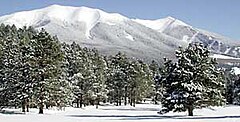Arizona Snowbowl
| Arizona Snowbowl | |
|---|---|
 |
|
|
Location in the western United States
|
|
| Location | Coconino County, Arizona, United States |
| Nearest city | Flagstaff - 7 miles (11 km) |
| Vertical | 2,300 ft (700 m) |
| Top elevation | 11,500 ft (3,505 m) |
| Base elevation | 9,200 ft (2,805 m) |
| Skiable area | 777 acres (3.14 km2) |
| Runs | 32 |
| Longest run | 2.0 mi (3.2 km) |
| Lift system | 7 total - 6 chairs (1 high-speed six-pack, 1 quad, 2 triples, 2 doubles) 1 surface |
| Terrain parks | 1 |
| Snowfall | 260 in (660 cm) / year |
| Website | arizonasnowbowl.com] |
Arizona Snowbowl is an alpine ski resort in the southwest United States, located on the San Francisco Peaks of northern Arizona, seven miles (11 km) north of Flagstaff. The Snowbowl ski area covers approximately one percent of the San Francisco Peaks, and its slopes face west and northwest.
Starting its skiing operations 79 years ago in 1938, the base elevation of Arizona Snowbowl is at 9,200 feet (2,805 m) above sea level, and the resort receives an average annual snowfall of 260 inches (660 cm). The lift-served summit at 11,500 feet (3,505 m) yields a 2,300-foot (700 m) vertical drop, the largest in Arizona, served by six chairlifts and two lodges, Hart Prairie Lodge and Agassiz Lodge.
Arizona Snowbowl is open year-round. Summer activities include:
Ole and Pete Solberg began the tradition of skiing in the Flagstaff area in 1915 when they used homemade wooden skis to glide down Mars Hill. By 1937, the US Forest Service allowed skiers recreational use of 777 acres on Humphrey’s Peak, originally permitting them to operate a rudimentary tow-rope to facilitate the steep trek from the newly built lodge up to the slopes. The first notable transfer of the special-use permit and purchase of Snowbowl’s ski facilities by a private entity was made in 1941 by Al Grasmoen and the Arnal Corporation.
The Arizona Snowbowl operates under a 777-acre (3.14 km2) special use permit issued by the U.S. Forest Service. In 1938, the Forest Service allowed the construction of the then small ski lodge and access road on the western slopes of the San Francisco Peaks. Full-scale development, with shops, restaurants, and lodges were first proposed in 1969, but the opposition of several tribes and community groups delayed further construction.
...
Wikipedia

